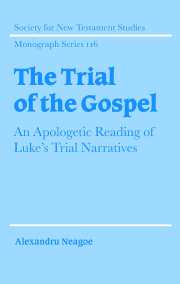Book contents
4 - The trial of Jesus in narrative retrospection
Published online by Cambridge University Press: 14 October 2009
Summary
Introduction
While, as indicated in chapter 2, it is customary for studies of the trial of Jesus in the Third Gospel to pay some attention to the narrative precedents of this event, virtually no attempt has yet been made to investigate the way in which subsequent elements of Luke's narrative may also (retrospectively) throw light on Luke's account of Jesus' trial. The paucity of such studies may appear understandable in view of the consideration that what determines the nature of a trial is what has been happening up to that point, rather than subsequent events. Nevertheless, a number of factors (which will be further substantiated in the course of the chapter) make the investigation of the present chapter necessary:
Luke's passion predictions (esp. 9.21; 18.31–3), as well as parallel passages in the resurrection narrative (24.7, 46) and in Acts (e.g. 2.22–4), seem to indicate that Luke thinks of Jesus' trial as of one piece with his death, resurrection and glorification. Consequently, the emphases of the trial narrative might be expected to exhibit certain common elements with the latter accounts, and, accordingly, one's findings in the latter may have a confirmatory (or corrective) role for those in the former.
[…]
- Type
- Chapter
- Information
- The Trial of the GospelAn Apologetic Reading of Luke's Trial Narratives, pp. 91 - 128Publisher: Cambridge University PressPrint publication year: 2002



